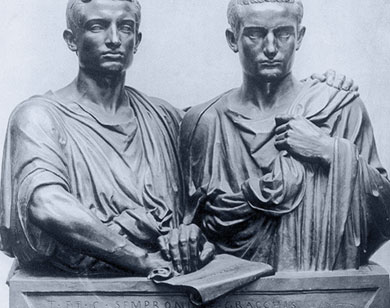
Ancient Rome’s government would not have been successful without the citizens who supported it. The Ancient Romans thought it was their responsibility and civic duty to the Republic and Empire to participate in government affairs. In Ancient Rome, a citizens participation included attending assembly meetings and voting in elections. Ancient Roman citizens of wealth believed it was their responsibility to help the Ancient Roman Empire by holding positions in office. In turn, this made them quite powerful locally and provided them with much respect and status among other Ancient Romans.
Voting in Ancient Rome was very complex and not every citizen was allowed to vote as there were limitations depending on what type of citizen one was. Full citizenship to partial citizenship was granted in Ancient Rome and each had their guidelines and allowances. There were also many people who did not have any citizenship as well. The Ancient Romans were very particular about how and who they gave citizenship and rights to. Granting citizenship to non-Roman citizens would prove to be one of the best things the Ancient Romans did to grow their vast empire.
Romanization of Conquered Lands
Ancient Rome had a very interesting and successful way of building their vast empire. Ancient Rome conquered many lands and people, but it did not end there. The Ancient Romans offered these conquered people something unheard of, citizenship and rights. Granting citizenship and rights to conquered people enabled the Ancient Romans to build their empire on a solid foundation. This meant that these once conquered people would not sit and wait to plot and create an uprising against Ancient Rome, but rather become part of the Ancient Roman government. These newly acquired citizens would contribute to Ancient Rome rather than try to tear it down. It should be noted that when people felt that they were not conquered, but part of this great powerful empire, it became one of Ancient Rome’s greatest political accomplishments.
Citizens, Partial Citizens, and Non-Citizens in Ancient Rome
In Ancient Rome there were generally classes of people. These classes were continually changing, but for the most part, Ancient Roman citizens were at the top, Allies and Conquered people in the middle, Freedmen (former slaves who were freed), and finally women and slaves at the bottom.
Male Roman Citizen – In Ancient Roman the male was in charge of family and all others within that family had to answer to him. Ancient Roman males had many privileges and freedoms within the Ancient Roman Republic and Ancient Roman Empire.
The rights given to Ancient Roman Citizens:
- Right to vote in the Republic/Empire
- Right to participate in Ancient Roman government
- Right to marry – Marriage was recognized by Ancient Rome as lawful
- Any child born to Ancient Roman citizens, who were legally married, was given citizenship as well
- Right to create legal binding contracts
- The right to a trial by an appropriate court
- Could not be tortured
- Could only be sentenced to death if he committed treason and was found guilty by a proper Ancient Roman court
- Could not be crucified-no Ancient Roman Citizen was crucified as it was a looked upon as a disgraceful death (usually was beheaded by guillotine)
- Could join Ancient Roman legions
- Many other rights and freedoms were granted to Ancient Roman citizens, although these freedoms and rights varied
Roman Women – Women of this time were the assumed responsibility of Male Roman Citizens. The oldest male was in charge of the family and made decisions regarding the household and family. Many of these women did have the same or similar rights as their husbands or parents. However, women were not even close to holding citizen status in Roman society. Ancient Roman women were not considered citizens but rather held in high regard and respect. In Ancient Rome women had few legal rights. Women were maybe a step above slaves where legal issues were concerned. Women were not allowed to vote or hold any type of official position. Wealthy women would sometimes fund religious ceremonies, festivals, or other types of events, but this was the limit to their involvement.
During the Ancient Roman Republic, women had limited rights and used marriage to align themselves with strong political men in hopes of securing a favorable future. During the Ancient Roman Empire, women were allowed more rights, but still not able to vote or hold office. However, women were allowed to own property, get a divorce, and even engage in business.
Roman Slaves – Ancient Roman slaves had no rights and were considered property although some slaves were paid a wage. As things changed in Ancient Rome, the Ancient Roman law made protections for slaves. However, it was very limited as compared to a Roman citizen. Some slaves were freed under manumission-This is when a slave owner frees his or her slaves. Slaves were freed for various reasons. If a slave owner died, Ancient Roman law dictated how many slaves could be freed.
Freedmen – Freedmen were former slaves who had gained their freedom in Ancient Rome. This freedom came in many forms. A slave owner could simply release their slave of duty and set them free. Another way a slave could be freed was by the will of a deceased owner. A deceased Roman citizen would put in their will that they wanted to grant freedom or manumission to their slave and it was granted. After a slave was free, they became Freedmen. Once a freedmen, a former slave could participate in Ancient Roman society . If a freedman or woman had children, they were considered free citizens.
It should be noted that Ancient Rome went though many changes thought its vast Kingdom, Republic, and Empire. Depending on who was ruling or what form of government was in action depended heavily on what occurred. This meant that the law constantly changed, what it meant to be a citizen altered at times, and the meaning of things varied greatly throughout the Ancient Roman culture.
Allies, Colonies, and Conquered people – Ancient Roman Allies, Colonies, and Conquered people were granted a “minor” form of citizenship in order to Romanize the newly conquered lands. This allowed Ancient Rome to grant the idea of citizenship without the full benefits or power of a true full citizen of Ancient Rome. This citizenship allowed Ancient Rome to grow tremendously without too much trouble from conquered lands; as many of these people became Roman allies.
To read more on Ancient Roman voting and Civic Duty, click the link below.

